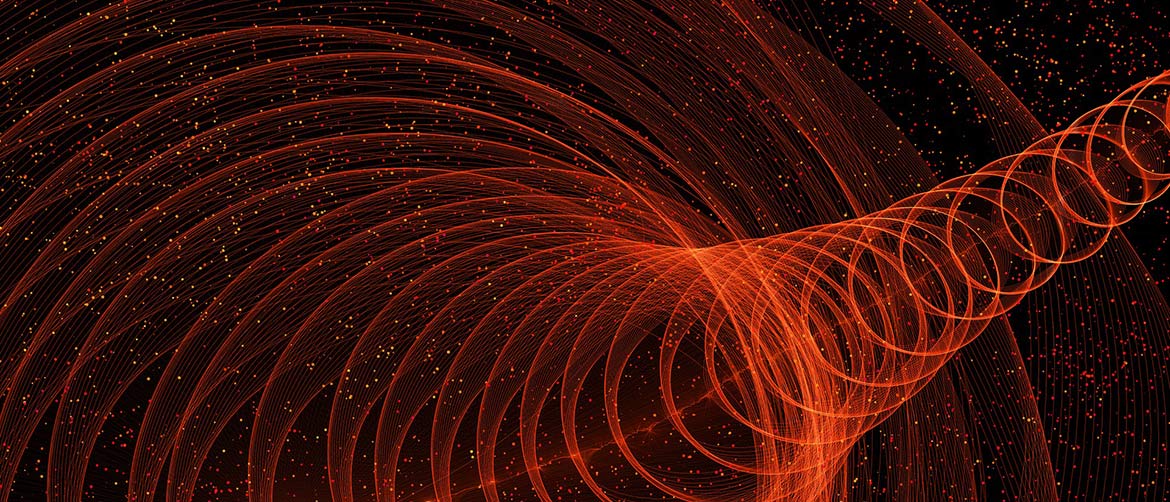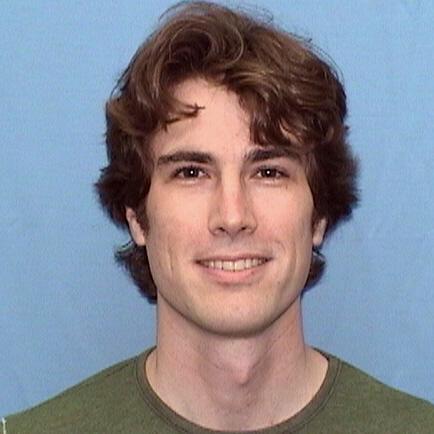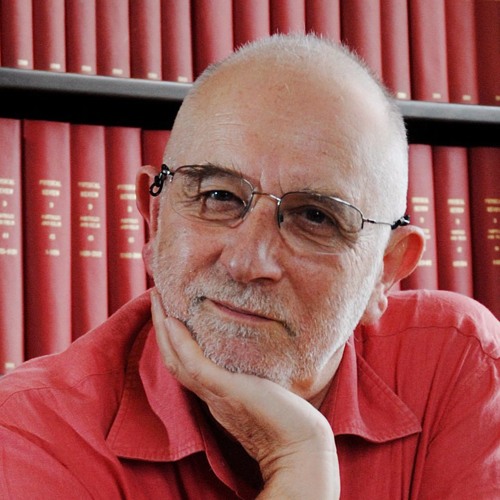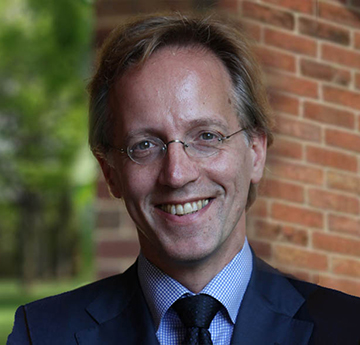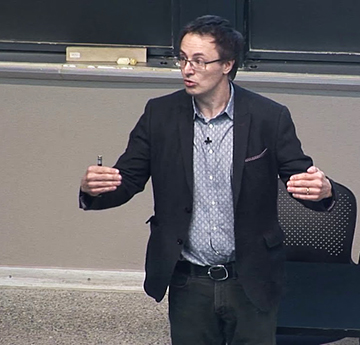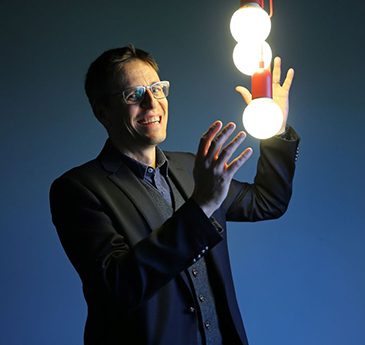Professor Sean Hartnoll - 2023 Lecture
Entropy: from Heat Engines to Black Holes and Quantum Computers
Professor Sean Hartnoll, is Professor of Mathematical Physics at the Dept of Applied Mathematics & Theoretical Physics (DAMTP), Cambridge University.
About the speaker: A leading theoretical physicist, his specialisation encompasses Quantum Field Theory, Gravity and String Theory. His research spans a number of areas of theoretical physics and most notably bridges the study of Condensed Matter systems (e.g. superconductors and Quantum Hall systems) with Black Hole physics.
Prof. Hartnoll pioneered the use of the holographic correspondence between gravity and QFTs to show how the physics of strongly interacting superconducting systems can in fact be captured by charged higher dimensional black hole solutions, in the process unlocking a long sought path towards understanding the intractable physics behind phenomena such as high-temperature superconductivity. For these and related pioneering research contributions Sean was awarded the prestigious New Horizons prize in 2015.
Professor Sir Michael Berry - 2022 Lecture
Making Light of Mathematics
Professor Sir Michael Berry, FRS, FRSE, FRSA, HonFInstP, HonFLSW is Melville Wills Professor of Physics at Bristol University.
About the speaker: A mathematical/theoretical physicist, he has made pioneering contributions in several fields of physics, and in the process generated entirely new scientific areas: the study of geometric phases commonly known as the Berry phase, and associated Berry curvature and Berry connection in quantum mechanics, singular optics and quantum chaos.
A physicist who relishes puzzles in optics, quantum & classical mechanics, his research straddles the borderlands of classical and quantum physics, where fascinating physical phenomena (e.g. singularities in rainbows, optics with plastic sheets, levitating tops, magic mirrors, caustics) are explained using equally fascinating and powerful mathematics, such as asymptotic, hyper-asymptotic , super-asymptotic (!) and resurgent series. Prof. Berry has received numerous major awards in recognition of his discoveries, including the Dirac Prize (IoP, 1990), the Dirac Medal (ICTP, 1996), the Wolf Prize (1998), and the Polya prize in mathematics (2005). He was knighted in 1992, is an elected Fellow of the Royal Society, elected member of the National Academy of Sciences of USA and three other national academies. Prof. Berry is widely known for his beautiful, captivating lectures that show the power of abstract mathematical ideas hidden in down-to-earth but fascinating physical systems: in his own words: "the arcane in the mundane”.
Watch the video
Professor Robert Dijkgraaf - 2019 Lecture
Title: Quantum Geometry and the fate of Space and Time
Professor Robbert Dijkgraaf, Director and Leon Levy professor, Institute for Advanced Study, Princeton.
About the speaker: Professor Dijkgraaf FRSE, presently Director of the Institute for Advanced Study at Princeton, is an eminent theoretical physicist whose research encompasses the interface of mathematics and physics, particularly within string theory and quantum field theory and their relation to geometry. He has also delved into quantum properties of black holes and shown how their thermodynamical properties arise from precise quantum mechanical mathematical counting formulae.
For his distinguished scientific achievements, Prof. Dijkgraaf was awarded the Spinoza Prize, the highest scientific award in the Netherlands in 2003. He has served as the President of the Royal Netherlands Academy of the Arts and Sciences, and was named Knight of the Order of the Netherlands Lion.
In addition to being a renowned mathematical physicist, Prof. Dijkgraaf is a passionate science educator and science communicator to the wider public, and a champion of curiosity-driven research which leads not only to the greatest scientific discoveries but also to the most revolutionary technological breakthroughs.
Watch the video
Professor David Tong - 2021 Lecture
The Allure of the Magnetic Monopole
Professor David Tong, Dept of Applied Math. and Theoretical Physics, Cambridge University.
About the speaker: Professor David Tong is a member of the High Energy Theory group at DAMTP, Cambridge University, and a Fellow of Trinity College. He is a leading theoretical physicist, specialising in Quantum Field Theory and String Theory. His research covers a vast array of topics ranging from Cosmology & String Theory to the physics of Monopoles, Vortices and the Quantum Hall effect, having made seminal contributions to each of these areas, often revealing subtle and beautiful connections between seemingly different phenomena.
Prof. Tong received his PhD from Swansea University in 1998, and subsequently held research positions at Kings College London, the Tata Institute of Fundamental Research (Mumbai), Columbia University NY, and the Massachusetts Institute of Technology (Boston). A recipient of several research awards, including the prestigious Simons Investigator and Royal Society fellowships, Prof. Tong is also widely acclaimed for his beautifully written and insightful lecture notes on a variety of topics in physics, ranging from Classical Mechanics to String Theory.
Known for his enthusiastic and engaging lecturing style, he is an extremely popular and effective communicator of physics to the general public — his public lectures available on social media sites have garnered several millions of views, one of the most highly viewed ones being his Royal Institution lecture on Quantum Fields.
Watch the video
Professor Didier Queloz - 2023 Lecture
“THE EXOPLANET REVOLUTION”
Professor Didier Queloz, FRS, is the Jacksonian Professor of Natural Philosophy at Cambridge University and and Professor of Physics, ETH-Zurich.
About the speaker: He is the originator of the exoplanet revolution in astrophysics. Until recently, the Solar System has provided us with the only basis for our knowledge of planets and life in the universe. In 1995 Prof Queloz dramatically changed this view with the discovery he made with Michel Mayor of the first giant planet outside the solar system. For this and subsequent ground breaking work on exoplanets he received the 2019 Nobel Prize in Physics.
Watch the Live Stream
This seminal discovery spawned a revolution in astronomy both in terms of new instrumentation and understanding of planet formation and evolution.
Through the following decades, Didier Queloz’s scientific contributions have led to enormous progress in detection and measurement capabilities of exoplanet systems with the goal of revealing information on their physical structure to better understand their formation and evolution by comparison with our solar system. More recently, he has been directing his efforts to the detection of Earth-like planets and Universal life. During the course of his career he has developed new astronomical equipment, new observational approaches and detection algorithms. He has been involved in and has conducted programs leading to the detection of hundreds of planets, include several breakthrough results.
Prof Queloz is an active populariser of science in general, and astrophysics in particular through numerous science documentaries, popular articles, TV and radio interviews, sharing the excitement of science with the wider public.
Since 2013, he has been professor at Cambridge University where he is leading a comprehensive research program with the goal of making further progress in our understanding of the formation, structure, and habitability of exoplanets in the Universe as well as to promote and share the excitement of this work with the public.
Abstract:
The wealth and diversity of planetary systems that have now been detected, have modified our perspective on planet formation as a whole and more specifically our place in the Universe. It also presents an opportunity for historical perspectives and an irresistible call to look for signs of life on these new worlds as a way to explore our own origins. I will introduce the audience with the challenges and recent progresses in this new field of research and will touch upon the emergence of a new paradigm for the origins of life on Earth.
- Time: Thursday, October 19th, 4:30 pm (tea/coffee/snacks from 4:00pm)
- Venue: Grove Lecture Theatre, Singleton Campus

